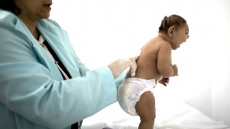TORONTO — A Canadian-led research team has taken a form of trash that promotes the spread of mosquitoes and turned it into a potential weapon against the disease-carrying insects.
The scientists have repurposed used tires — which can fill with rain water and provide an ideal breeding chamber for female mosquitoes — by fashioning chunks of the rubberized material into traps for their eggs.
"What we are aiming at is destroying the second generation of mosquitoes, by destroying the eggs and the larvae," said Gerardo Ulibarri, a professor of biochemistry at Laurentian University in Sudbury, Ont.
Ulibarri and his fellow researchers tested the trap — dubbed an ovillanta — in Guatemala, where species of the Aedes mosquito can carry dengue, chikungunya and Zika. The insects transmit the viruses among people through their bites.
Traditionally, scientists have captured mosquito eggs in monitoring devices called ovitraps, litre-sized buckets that hold water or an attractant solution, along with a strip of special paper on which the female mosquito lays her eggs.

The ovillanta — "llanta" is one word in Spanish for tire — is made from a piece of tire shaped to contain water and a pheromone solution to attract female mosquitoes. The wall-hung vessel is fitted with a valve to direct the liquid to a filter so it can be recycled.
After the eggs are trapped on paper strips, they are destroyed and the filtered water is reused.
"The key to this is the recycling of the solution," Ulibarri said from Guadalajara, Mexico. "In these remote places, clean water is a luxury. So recycling saves a lot of water."
In a study conducted during a 10-month period starting in February 2015 in Sayaxche, Guatemala, the researchers compared how efficient the 84 ovillantas were in trapping mosquito eggs compared with the same number of ovitraps installed in a total of 14 neighbourhoods in the remote community of about 14,000 people.
They found their homemade tire traps captured almost seven times as many eggs — about 182,000 versus roughly 27,000 in the ovitraps.

"This is a long process, this is a preventive process," Ulibarri said. "We are preventing the (next) generation of mosquitoes."
If the traps are set out during the dry season in Guatemala, which runs from December to May, mosquitoes have no choice but to lay their eggs in the ovillantas, he explained.
"Then ... by the time the rainy season comes in, when we have more natural ponds created, the amount of mosquitoes that are capable of laying eggs is reduced," Ulibarri said.
"And if we don't have mosquitoes, we don't have transmission."
The Guatemala study was funded with a $112,000 grant from Grand Challenges Canada, a federally sponsored program that supports innovative global health projects.
The study was initially intended to see how well the traps worked as a potential means of reducing transmission of the dengue virus, a potentially fatal infection.
"We didn't think about the Zika virus because we hadn't heard of it until the end of the project," said Ulibarri.
Cases of Zika were first detected in Brazil in May 2015, after the mosquito-borne virus made its way from Africa to Asia and then to islands in the South Pacific. It has since reached epidemic levels throughout South and Central America, southern Mexico and the Caribbean.
Most people infected don't develop symptoms. But the disease has been linked in Brazil to thousands of cases of newborns with undersized heads and underdeveloped brains, whose mothers were likely infected during pregnancy, as well as cases of a usually temporary paralyzing condition called Guillain-Barre syndrome.

Since Zika is carried by the same kind of mosquito that harbours dengue and chikungunya, "we could extrapolate to the Zika virus" with testing of the ovillanta, Ulibarri said.
"If we eliminate the mosquito, we can reduce the transmission of the Zika virus as well."
The researchers proposed the Guatemalan study after they found that installing standard ovitraps around a site in Sudbury cut the number of mosquitoes that carry the West Nile virus by 90 per cent.
A followup study based on the same design resulted in a 71 per cent drop in the Aedes mosquito population in an area of Mexico.
Using worn-out tires to make the traps is inexpensive and ecologically beneficial — tires make up almost 30 per cent of mosquito breeding sites in the Guatemalan city.
"People thought it was very cool because we were recycling the tires," said Ulibarri. "So instead of seeing it in the backyard on the ground producing mosquitoes, now they had a purpose of reusing the tires."
Part of the study was aimed at involving the community and local health workers in the process of installing and maintaining the traps, as well as introducing strategies to remove potential breeding sites in homes and gardens.
"At the beginning it was a difficult message to get across," he said. But once residents understood the life cycle of the mosquito and saw how the ovillantas worked, "they got very interested."
"They asserted that there were less mosquitoes as time went by and they wanted to make sure they didn't come back."

The researchers hope use of the tire-based traps can be expanded to other countries affected by the mosquito-borne diseases.
A community in Paraguay and one in Mexico are trying out the devices, said Ulibarri, while in Guatemala "they are already expanding to other cities that are affected by the dengue fever, and now they are also scared of the Zika virus, of course."
Dr. Peter Singer, CEO of Grand Challenges Canada, said it's exciting to see something that pre-dated the Zika epidemic now being used as a potential means of defeating the global health threat.
"I think this is exciting because what Gerardo and his team are doing essentially is trying to build a better mouse trap," he said. "Except it's not a mouse trap, it's a mosquito trap directed against the world No. 1 public health emergency — Zika."



